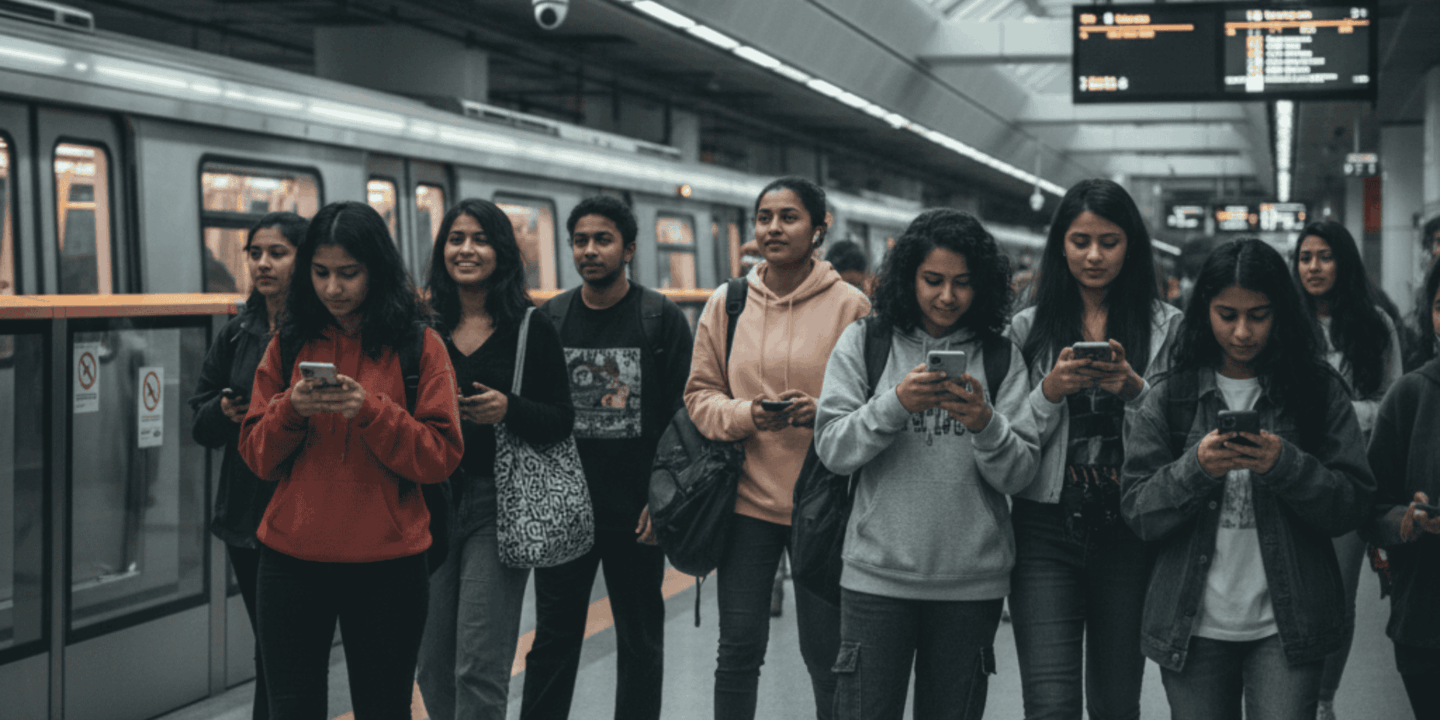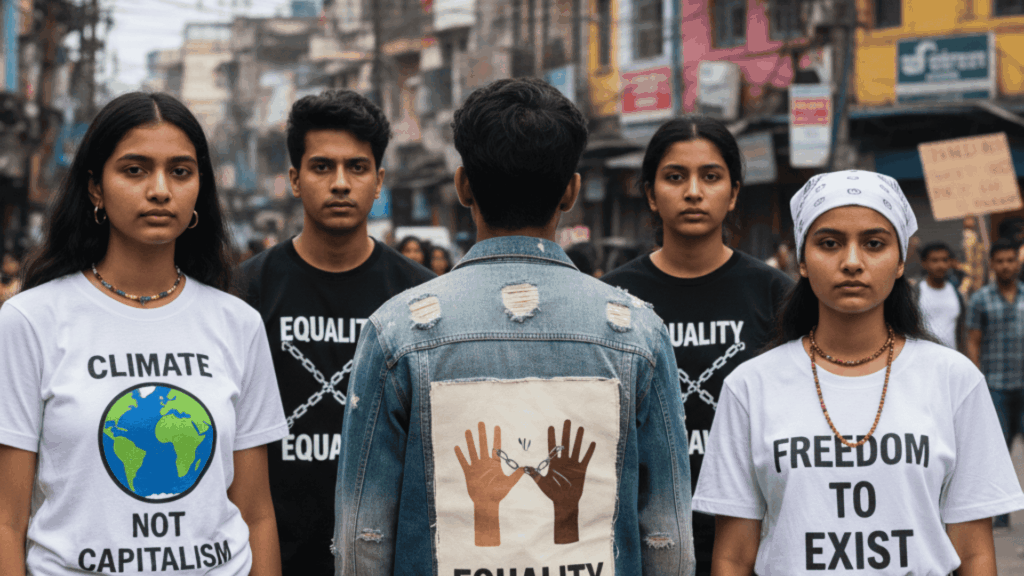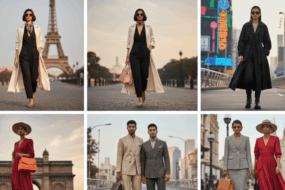
Gen Z in India is reshaping metro living through sustainable fashion choices, hybrid work-life routines, digital-first behaviour, community-driven experiences, and value-based spending. They prioritise individuality, thrift culture, creator-driven careers, and wellness, transforming metros into youth-led cultural hubs.
Gen Z India Is Rewriting What Metro Living Looks Like
(StyleGods Exclusive Trend Report)
Based on emerging youth-culture studies, digital behaviour analysis, and urban lifestyle trends, India’s metros are undergoing a transformation driven not by brands or institutions, but by Gen Z — the country’s first fully digital-native generation.
Born between 1997–2012, they treat lifestyle as identity, consumption as self-expression, and city living as a creative ecosystem. Across Bangalore, Mumbai, Delhi, Hyderabad, and Chennai, their choices influence fashion cycles, culture shifts, career paths, social environments, and spending patterns.
Below is a data-backed, editorial-style breakdown of how Gen Z is reprogramming metro culture.
1. Fashion as a Social Statement, Not a Status Symbol

For Gen Z, fashion communicates identity more than status.
A growing number of young metro consumers prioritise purpose-led aesthetics, comfort, and self-expression.
NLP-Optimized Fashion Signals
- Sustainable fashion India
- Gen Z individuality
- Urban micro-aesthetics
- Thrift fashion trends
- Gender-neutral silhouettes
Key Shifts in Metro Fashion Culture
- Sustainable choices: thrift stores, upcycled fashion, planet-conscious brands.
- Individuality over mass trends: micro-aesthetics, Pinterest-core edits, niche subcultures.
- Comfort-driven dressing: gender-free fits, athleisure, utility wear.
- Affordable luxury: mixing one luxury piece with accessible basics.
City Fashion Signatures
- Bangalore: tech-meets-streetwear, muted utilitarian basics.
- Delhi: quiet luxury, capsule wardrobes, indie pop-ups.
- Mumbai: coastal-cool layers, thrift-driven street style.
- Hyderabad/Chennai: fusion-smart casuals, soft minimalism.
Insight:
Urban consumer studies show a rise in sustainable, identity-first fashion choices among 18–28-year-olds, especially in metros with strong youth populations.
2. Metro Living = A Hybrid Lifestyle
Gen Z sees metros not as “places to live” but as multi-functional ecosystems.
Core Hybrid Lifestyle Behaviours
- Working from cafés
- Balancing corporate jobs with creator side-hustles
- Switching between offline wellness and online socialising
- Participating in weekend creative markets
Real Metro Rituals
- Café working: Blue Tokai, Third Wave
- Indie nights, brewery gigs
- Workout clubs: pilates, runners’ communities
- Thrift pop-ups and maker markets
- Content creation meet-ups
Insight:
Research indicates over 58% of urban Gen Z prefer hybrid or flexible work arrangements, directly influencing café culture, co-working expansion, and after-hours creative economies.
3. Sustainability Isn’t Trendy — It’s Non-Negotiable
Gen Z’s sustainability values shape their shopping habits and brand preferences.
Why Gen Z Chooses Sustainable Fashion
- Transparency
- Longevity
- Circular economy
- Conscious consumption
Evolving Metro Trends
- Thrift swaps and recycling events
- Demand for eco-friendly fabrics
- Preference for transparent supply chains
- Buying fewer, high-quality pieces
Insight:
Search trends in metros show a significant rise in “ethical clothing India” and “sustainable brands,” reflecting growing environmental consciousness.
4. The Creator Mindset Is Redefining Career Paths

Gen Z is building multi-hyphenate careers, merging creativity with digital-first work.
Top Creator-Economy Identities
- Content creators
- Designers
- Sustainable fashion entrepreneurs
- AI specialists
- Stylists, photographers
- Community managers
Even corporate employees identify with secondary creative labels.
Insight:
Reports estimate India’s creator economy to grow exponentially by 2027, with metros serving as the primary growth hubs.
5. Spending Priorities Are Shifting
Gen Z rejects old markers of success such as gold or real estate.
They invest in experience-first, identity-led purchases.
Where Metro Gen Z is Spending
- Travel and culture events
- Fashion drops
- Wellness and fitness
- Tech gadgets
- Upskilling courses
- Curated thrift edits
Brand Appeal Drivers
- Hyper-personalisation
- Limited drops
- Story-led marketing
- Sustainable value offerings
6. Digital-First Behaviour Shapes Everything

Gen Z lives in metros that exist in two layers — the physical and the digital.
Key Digital Behaviours
- Discovering fashion on Instagram, Pinterest, YouTube
- Using AI for outfit planning
- Geo-tagging cafés, gyms, thrift markets
- Joining online communities (Discord, Reddit)
- Following hyper-local search patterns
Insight:
Urban consumer mapping shows heavy reliance on digital discovery journeys before any lifestyle or fashion purchase.
7. Community Is the New Luxury
For Gen Z, belonging matters more than possessions.
Community Spaces Shaping Metro Life
- Fitness collectives
- Running and cycling groups
- Indie music gigs
- Art pop-ups
- Thrift festivals
- Book and hobby clubs
Brands that offer community-first experiences win sustainable loyalty.
Conclusion: Gen Z Is Rewriting Metro Living
Urban India is entering a new chapter led by Gen Z — intentional, expressive, value-driven, and future-centric.
Metros are transforming into ecosystems defined by sustainability, creativity, digital identity, and community culture. Brands that align with these shifts will lead the next decade. Others risk becoming invisible in the digital-first world Gen Z inhabits.
FAQ’S
1. What defines Gen Z metro lifestyle in India?
Gen Z metro lifestyle is defined by sustainable fashion, hybrid work cultures, digital-first behaviour, community-driven spaces, and experience-led consumption.
2. Why is Gen Z influencing metro fashion trends?
Because they prioritise individuality, thrift culture, gender-neutral dressing, and purpose-led fashion, driving major shifts in urban style choices.
3. What drives Gen Z’s spending habits in metros?
Experiences, wellness, fashion drops, creator tools, and tech gadgets form their primary spending clusters.
4. How is Gen Z impacting sustainability in Indian metros?
Through conscious buying, preference for transparent brands, recycling events, and supporting eco-friendly fashion labels.
5. How does Gen Z balance work and lifestyle?
By adopting hybrid routines that include cafés, co-working spaces, fitness groups, side-hustles, and content creation.













